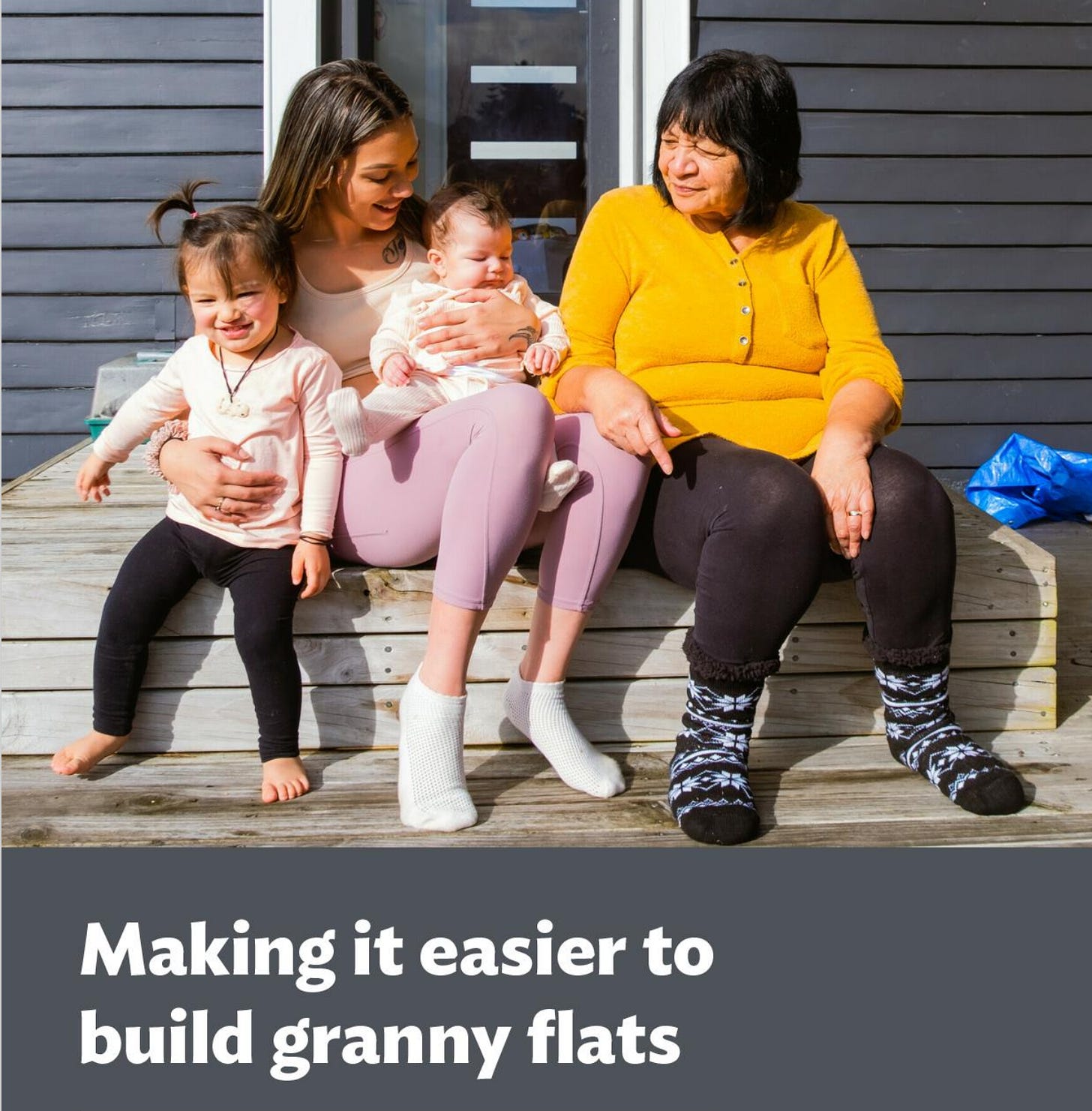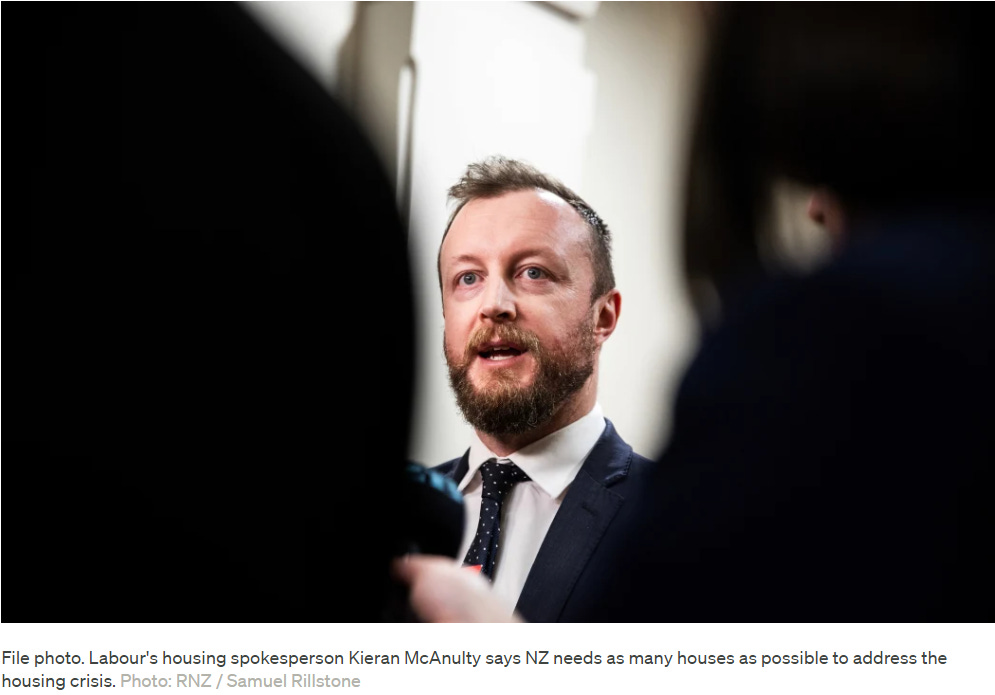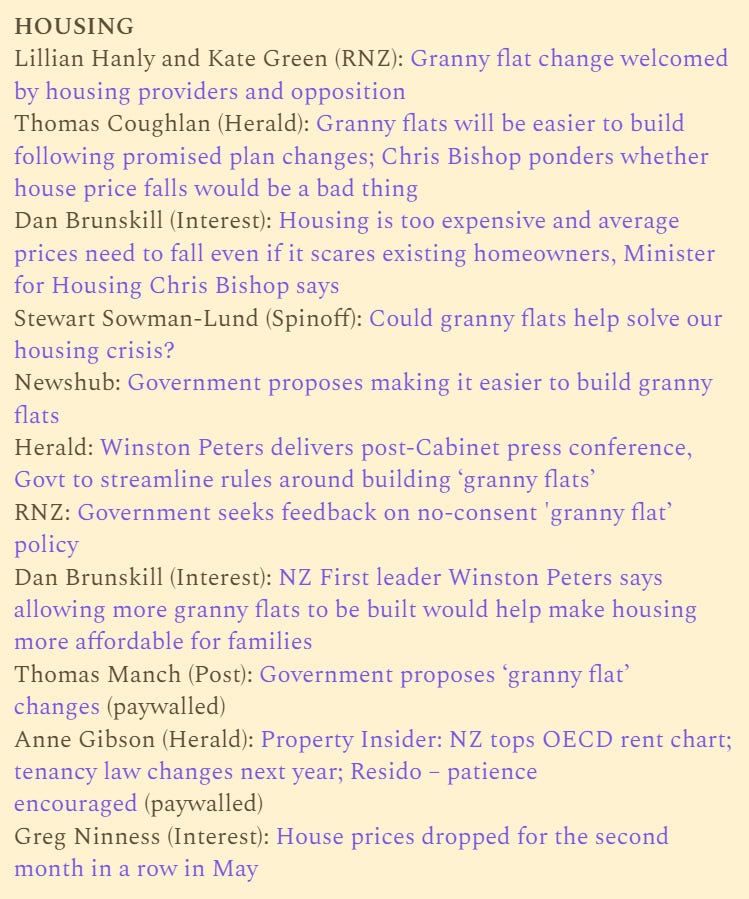Granny Flats: A Potential Game-Changer?
If it is, this policy is going to do a lot of heavy lifting.
The government aims to streamline the construction process and reduce homeowners' costs by allowing granny flats up to 60 square meters to be built without consent.
Will it help with housing supply and affordability issues? Not alone, no. This is an uber-complex problem that many liberal democracies struggle with, so I won't ever oversimplify it. It will take many different policy changes to ensure we can drag ourselves out of this hole; I’m just not sure this is it. Or is it? Is it a step in the right direction? I don’t think it’s enough.
Timo Neubauer explains, “According to Infometrics, 54.3% of the average household income would be needed to service a 20-year mortgage on the average house value. To make matters worse, more than 25% of our tenants spend more than 40% of their disposable income on rent. By comparison, this ratio is 10% in Australia and 5% in Germany—we are the worst of any OECD country on this metric.” WTAF?
Quick side question: what would it take for New Zealand to get behind capital gains or land tax? Anyway, that’s another whole post in itself.
Anyhow, let’s look at the granny flat policy.
The Ministry of Business, Innovation, and Employment “Making it easier to build granny flats” Discussion Document states that “as part of our wider housing and building reforms, we want to make it easier to build small, self-contained, and detached houses, commonly known as ‘granny flats’. New Zealand’s population changes, including smaller family sizes and an ageing population, mean that demand for granny flats will increase.” Considering the growing, diverse, and aging population, I like that; it’s music to my ears.
I wholeheartedly support any initiative to enhance the well-being of our older populations and any policies that enable families to stay as close to each other as possible. So, if this policy only does that, I’m in! I said it in my article examining the two government coalition agreements; the one I agree with most strongly is the National and NZ First's goal to increase benefits for senior citizens.
But is this it? Will it help with housing supply, demand, and prices and enhance our senior citizens' well-being? If it is, this policy will do a lot of heavy lifting.
Acting Prime Minister Winston Peters believes that unlocking the potential of backyard spaces could open the door to new ways of living, particularly for those struggling with high housing costs. Yes, it unlocks new ways of living, but I am unsure how it will solve the housing issues. So, of course, this policy is not without resource consent and is not without contradictions.
While some see it as a pragmatic step towards increasing housing supply, others question its effectiveness as a long-term solution to the housing crisis.
I like Labour's housing spokesperson, Kieran McAnulty, views about a “dumb idea” and a “good idea”. He highlights two contrasting actions by the government regarding housing policy, shedding light on the complexities of addressing New Zealand's housing crisis.
The "Dumb Idea": Cutting $1.5 Billion from the Housing Budget
McAnulty criticized the government's decision to take $1.5 billion out of the housing budget and drop funding for public houses, labelling it a "dumb idea." This move is seen as counterproductive for several reasons:
Reduced Funding for Public Housing: The cut reduces funding for building much-needed public and social housing units.
Exacerbating the Housing Crisis: Cutting funding for public housing exacerbates the housing crisis and the shortage of affordable homes for low-income families and vulnerable groups.
Contradicting Housing Goals: It goes against the goal of increasing the supply of public housing to address the housing crisis.
Deterioration of Existing Stock: Reducing investment in public housing can lead to a decline in existing stock and fewer new builds, worsening the situation.
The "Good Idea": Allowing Granny Flats Without Building Consents
In contrast, McAnulty views the government's proposal to allow granny flats or small dwellings under 60 square meters to be built without building consent as a potentially "good one:”
Increasing Housing Supply: It could help increase the overall housing supply by making it easier and cheaper for homeowners to build additional small dwellings on their properties.
Streamlining the Process: Removing the need for building consents streamlines the process and reduces costs, encouraging more granny flat construction.
Providing Affordable Options: Increasing the supply of smaller, more affordable housing units can offer more options for renters and first-time buyers struggling with high housing costs.
A Step Towards Affordability: While not a complete solution, it is a step towards increasing housing availability and affordability.
His stance suggests that while increasing the housing supply through this measure should be supported, it should not come at the cost of compromising building standards and regulations.
A Potential Game-Changer or a Band-Aid Solution?
While the proposal has garnered support from housing providers and the opposition, some experts remain sceptical about its ability to significantly alleviate the housing crisis. And well, there are a lot of experts. Bryce Edwards summarizes the many articles that came out on 18 June last week about this topic in his daily newsletter, NZ Politics Daily: 18 June 18, 2024
Stewart Sowman-Lund from The Spinoff cites an expert who suggests that a "higher-density, more planned approach" might be more effective in addressing the housing shortage, particularly in major cities.
Housing Minister Chris Bishop, however, sees the granny flat proposal as part of a broader strategy to address housing affordability. In a bold statement, he expressed a desire for house prices to fall to three to five times the average household income over the next couple of decades. This unconventional stance challenges the traditional notion that rising house prices favour homeowners.
A Shift in Mindset: Is This Policy Embracing Unconventional Solutions?
The granny flat proposal and the government's willingness to consider house price declines could be seen as a shift towards embracing unconventional solutions to New Zealand's housing crisis. Is it, though? Asking for a friend, what do you think?
While the effectiveness of these measures remains to be seen, I guess they represent a departure from the status quo and a recognition that some actions are needed to address the complex issue of housing affordability. As the consultation period for the granny flat proposal continues (you can submit feedback on the discussion document from June 17, 2024, to August 12, 2024), observing the public's response and the potential impact on housing supply and affordability in the coming years will be interesting.
The consultation opens on Monday 17 June and submissions can be received until 5pm Monday 12 August 2024. The public can provide feedback online or by emailing grannyflats@mbie.govt.nz
Some Final Considerations
When considering this issue, below are a few of the standout considerations when thinking about granny flats
Lack of Oversight and Quality Control
Allowing granny flats to be built without consent raises concerns about quality control and adherence to building standards. Without council oversight, there is a risk of substandard construction, fire safety issues, and potential health hazards. One Reddit user expressed scepticism, stating, "Allowing unconsented dwellings seems like a bad idea. That's just asking for trouble." There are valid concerns about the potential for poorly constructed or unsafe dwellings without regulatory oversight.
Infrastructure and Service Provision
Granny flats increase housing density without triggering development contributions that councils typically charge to fund infrastructure upgrades. This could strain existing infrastructure like water, sewage, and transportation systems, especially in areas with high uptake of granny flats.
Environmental and Neighborhood Impacts
Environmental impacts, such as flood risks and potential effects on neighbouring properties, may be inadequately considered without resource consent processes. Councils would be limited to managing issues like site coverage, boundary setbacks, and other zoning regulations designed to maintain neighbourhood character and amenities.
Equity and Affordability Concerns
While the intent is to increase the supply of affordable housing, there are concerns that granny flats could be used for short-term rentals or Airbnb-style accommodation, potentially exacerbating housing affordability issues.
Additionally, some argue that a more comprehensive, planned approach to higher-density housing may be more effective than relying solely on granny flats. In summary, the main drawbacks revolve around potential risks to building quality, infrastructure strain, environmental impacts, neighbourhood character, and the possibility that granny flats may not effectively address housing affordability if used for other purposes. Careful consideration of safeguards and criteria is necessary to mitigate these risks.
I hope this was insightful. Catch you next Tuesday!








IMHO we need to flood the housing market with all types of building to bring rents down for our young. Im so here for the Chihuahuas too ❤️